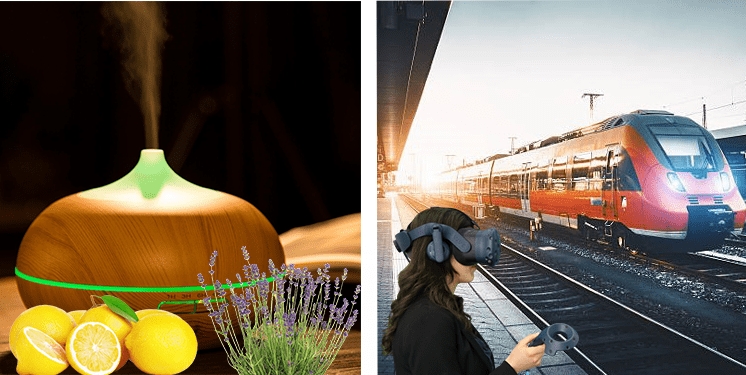Neuroscience and virtual reality: an innovative approach to study scents
- Published in Blog
More and more companies are paying attention to the new frontier of the study of scents, a field that is spreading intensively and creating new strategies. Seeing and touching is no longer enough, the smell becomes an exciting nectar. There is a relationship between olfaction and brain, in fact scents are able to affect our cognitive functions and mental states. Scents have the ability to stimulate several areas of the brain, generating emotions and memories.
In this regard, a study was conducted to investigate, through the use of electroencephalography (EEG) and virtual reality (VR), the impact of the scent of lavender and lemon, associated respectively with relaxation and activation, on the mental effort of participants when listening to two messages: one generic (welcome message) and one informative (slowdown message). These messages were heard during a train journey from Rome to Milan, simulated with VR.
VR allowed to design a highly immersive environment reducing complications such as: the excessive cost of the real journey, the impossibility to control environmental variables (background noises, distracting elements, etc), limiting the times. The EEG was important for analysing the participants' mental effort.
Results showed a significant increment of mental effort for subjects exposed to lavender in comparison to those exposed to lemon scent when listening to the slowdown message. Considering the relaxing properties of lavender, the results seem to indicate that a calm state creates the condition for better elaboration of the information provided by slowdown message. The impact of the smell also acts even if people are not always aware of it. Despite the fact that all subjects were exposed to a specific smell (lemon or lavender) during the experiment, more than half of the sample (57%) they were unaware of the presence of a smell and only 21% correctly recognised the specific fragrance to which were exposed.
This research shows how the use of the EEG has been important to understand the cognitive effects of scents impossible to observe verbally. The combined approach of neuroscience and virtual reality has been useful and may pave the way for other applications to measure the impact of olfactory stimuli in marketing and communication activities.







